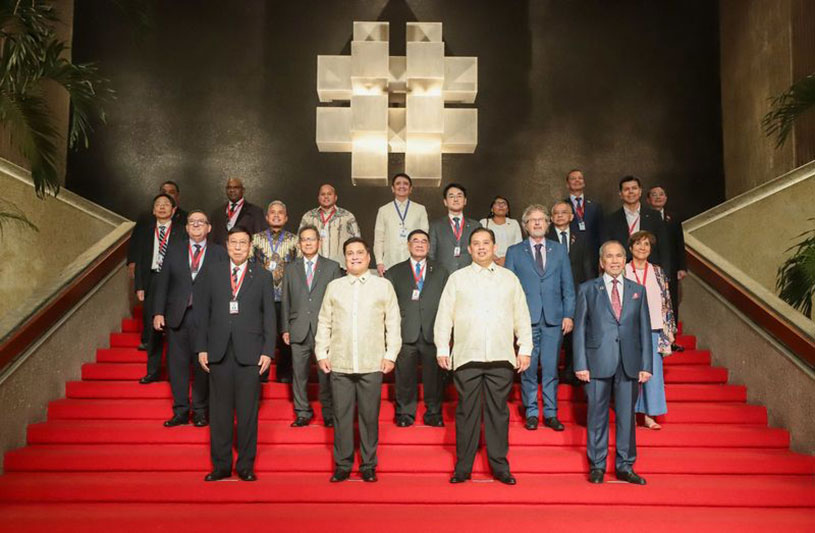Indonesia pushes East, South China Sea freedom of navigation at Manila forum

INDONESIA has drafted a resolution at the 31st Asia-Pacific Parliamentary Forum (APPF) in Manila this week calling on member-countries to respect international maritime laws and promote freedom of navigation in the East and South China Sea, amid China’s increasing assertiveness at sea.
The world’s largest archipelagic state called on members to “double the efforts in promoting and maintaining peace, security, stability, safety and freedom of navigation across the East and South China Sea,” according to the draft document posted on the APPF website.
It also said countries should peacefully resolve sea disputes according to universally recognized principles of international law.
Indonesia also called on members to fully respect the United Nations Convention on the Law of the Sea (UNCLOS) and ensure the enforcement of the 2002 Declaration on the Conduct of Parties in the South China Sea (DOC), which should “promote an environment conducive to the early conclusion of an effective and substantive Code of Conduct in the South China Sea.”
It urged APPF member-countries to continue working on protecting the safety of the so-called sea line communications both in the East and South China Sea for search and rescue, preventing oil spills in ocean, regulating maritime installations and counter-operations against piracy and terrorism.
Members should also take advantage of cooperation in blue economy development while boosting cooperation within the APPF and external partners to foster maritime security partnerships in the region.
“Respect for UNCLOS, freedom of navigation and possibly a rules-based order will be discussed,” Senate President Juan Miguel F. Zubiri told a news briefing on Thursday.
Under the 1982 UNCLOS, a country has rights to its exclusive economic zone (EEZ), which extends up to 200 nautical miles (370 kilometers) offshore from its land coast.
Indonesia’s resolution would be discussed by delegates from 19 countries including China, Mr. Zubiri said.
He added that the Philippines, Mexico, Japan and Australia filed similar resolutions calling for peace and security.
“The [resolutions] do not include specific problems like our problem in the West Philippine Sea or the arbitral ruling because we want an acceptable resolution for all our delegates,” he said in Filipino.
The Philippines has been unable to enforce a 2016 arbitral ruling by a United Nations-backed tribunal that voided China’s claim to more than 80% of the South China Sea based on a 1940s map.
A total of 275 foreign delegates will attend this year’s parliamentary forum, which will tackle 37 draft resolutions on peace and stability, combating transnational crimes, critical infrastructure and universal healthcare, among other things.
The resolutions will be discussed in several working groups and will be consolidated into one main resolution to be adopted by the forum’s plenary on Saturday.
The Foreign Affairs department last week called on China to remove “illegal structures” and stop what it called the militarization of the South China Sea, particularly in areas within the Philippines’ exclusive economic zone.
The Philippines has called on neighbors like Malaysia and Vietnam to create a separate code of conduct on the South China Sea, President Ferdinand R. Marcos, Jr. said on Nov. 20, citing the slow progress in the code of conduct between China and the Association of Southeast Asian Nations (ASEAN).
Tensions between the Philippines and China have flared after the latter’s coast guard on Aug. 5 fired water cannons on resupply ships trying to deliver food and other basic items to a grounded Philippine ships at Second Thomas Shoal.
Speaker Ferdinand Martin G. Romualdez said discussions on regional peace would include support for a “rules-based international order” and “UN-centered multilateralism.”
The Philippines has drafted a resolution calling on APPF members to “enhance confidence-building measures to effectively alleviate tensions, proactively prevent disputes and mitigate the escalation of ongoing disputes between or among states in the Asia-Pacific region.”
“Dialogue should always be there, constant dialogue and discussions on how we can come up with a common stand on how we will treat one another in the South China Sea-West Philippine Sea issue,” Mr. Zubiri said. — Beatriz Marie D. Cruz



